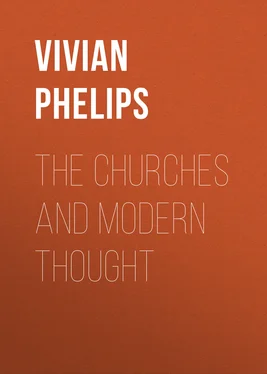Vivian Phelips - The Churches and Modern Thought
Здесь есть возможность читать онлайн «Vivian Phelips - The Churches and Modern Thought» — ознакомительный отрывок электронной книги совершенно бесплатно, а после прочтения отрывка купить полную версию. В некоторых случаях можно слушать аудио, скачать через торрент в формате fb2 и присутствует краткое содержание. Жанр: foreign_prose, foreign_religion, Философия, foreign_antique, на английском языке. Описание произведения, (предисловие) а так же отзывы посетителей доступны на портале библиотеки ЛибКат.
- Название:The Churches and Modern Thought
- Автор:
- Жанр:
- Год:неизвестен
- ISBN:нет данных
- Рейтинг книги:4 / 5. Голосов: 1
-
Избранное:Добавить в избранное
- Отзывы:
-
Ваша оценка:
- 80
- 1
- 2
- 3
- 4
- 5
The Churches and Modern Thought: краткое содержание, описание и аннотация
Предлагаем к чтению аннотацию, описание, краткое содержание или предисловие (зависит от того, что написал сам автор книги «The Churches and Modern Thought»). Если вы не нашли необходимую информацию о книге — напишите в комментариях, мы постараемся отыскать её.
The Churches and Modern Thought — читать онлайн ознакомительный отрывок
Ниже представлен текст книги, разбитый по страницам. Система сохранения места последней прочитанной страницы, позволяет с удобством читать онлайн бесплатно книгу «The Churches and Modern Thought», без необходимости каждый раз заново искать на чём Вы остановились. Поставьте закладку, и сможете в любой момент перейти на страницу, на которой закончили чтение.
Интервал:
Закладка:
Philip Vivian
The Churches and Modern Thought / An inquiry into the grounds of unbelief and an appeal for candour
TO MY WIFE AND CHILDREN
PREFACE TO FIRST EDITION
What does a man seek when he examines his religious creed? To this question Canon Liddon replies as follows:—“He seeks intellectual satisfaction and moral support. His intellect asks for reliable information upon certain subjects of the most momentous importance. How does he come here? Whither is he going? What is the purpose and drift of the various forms of existence around him? Above all, what is the nature, what are the attributes and dispositions, of that Being to whom the highest yearnings of his inmost self constantly point as the true object of his existence? In asking that the answers to these questions shall be definite, that what is certain shall be affirmed as certain, what is doubtful as doubtful, what is false as false, he is only asking that his religious information shall be presented in as clear and practical a shape as his information on other subjects. In no department of human knowledge is haziness deemed a merit; by nothing is an educated mind more distinguished than by a resolute effort to mark the exact frontiers of its knowledge and its ignorance; to hesitate only when hesitation is necessary; to despair of knowledge only when knowledge is ascertainably out of reach. Surely on the highest and most momentous of all subjects this same precision may be asked for with reverence and in reason; surely the human mind is not bound to forget its noblest instincts when it approaches the throne and presence of its Maker?” ( Some Elements of Religion , p. 24).
Again, in his New Year’s message for 1905, the Archbishop of Canterbury condemns indifference to truth as a vice, and “drifting along the current of popular opinion” as a sin. He invites and persuades us to use “the sadly-neglected powers and privileges of rational thought and common sense.”
The duty of thinking, therefore, is now recognised by the Church—it was not formerly. But what will be the result of this thinking? In his book, The Hearts of Men , Mr. Fielding tells us that “no man has ever sat down calmly unbiassed to reason out his religion, and not ended by rejecting it.” Mr. Fielding adds: “The great men, who have been always religious, do not invalidate what I say.... There is no assumption more fallacious than that, because a man is a keen reasoner on one subject, he is also on another. Men who are strictly religious, who believe in their faith, whatever their faith may be, consider it above proof, beyond argument.... It is emotion, not reason; feeling, not induction.” ( The Hearts of Men , pp. 142–3.)
Does not this deep and sympathetic writer furnish us with a true picture of men’s hearts? What if, after exercising their privileges of rational thought and common sense, the majority of men find that Christianity no longer gives them either intellectual satisfaction or moral support? What if they finally arrive at the conclusion that Christianity and all supernatural beliefs are but the survival of primitive superstitions which can no longer bear the light of modern knowledge? These are the grave questions which now confront us.
A man may enter, and generally does enter, upon his inquiry biassed in favour of religious belief of some kind. He approaches the subject in a reverent frame of mind. In his private prayers to his God he does not neglect to ask for heavenly guidance. He evinces precisely the spirit which a divine would consider becoming. But as his inquiry proceeds there comes a time when his religious bias disappears—when he can no longer feel what he could honestly call reverence. He discovers that what he thought was known, and had actually been revealed, is unknown. How can he believe in and worship the Unknown? More than ever he feels his own insignificance and ignorance; but the feeling thus excited, while akin to awe, is divested of reverence. Pursuing his search far enough, he succeeds in extricating himself from a quagmire of demonstrably false superstitions. Finally he reaches solid ground, and builds his life upon it.
Unfortunately, many never pursue their inquiry up to this stage; they become fearful, or they give it up as a hopeless entanglement, or they find they have not the requisite leisure. Perhaps, therefore, the information gained by one of the more fortunate may be of some little service to others. It will be my endeavour to set forth in this book not only the destructive, but also the constructive, results of a search for truth.
P. V.
January, 1906.PREFACE TO SECOND EDITION
“This book,” writes one of its clerical critics, 1 1 In the June (1906) number of Review of Theology and Philosophy , edited by Professor Allan Menzies, D.D.
“is evidently the honest, outspoken opinion of one who, having been brought up in an unquestioning acceptance of the orthodox doctrines of Christianity, has gradually drifted into the extreme of Rationalism.” Up to a certain point my friend is right. I was indeed brought up in an unquestioning acceptance of the orthodox teachings of Christianity; but, while my conversion to Rationalism has certainly been gradual, I may fairly claim that the process has been something very different from merely drifting. Long and careful study, the reluctant abandonment of a cherished belief, the adoption of an attitude which is unpopular and which distresses many who are near and dear to me, the practical application of the principles of Rationalism to daily life, involving as it does the serious step of bringing up my children in strict accordance with my firm convictions—these are surely not the ways of one who has permitted himself to drift. A man might—he often does—drift into indifferentism, or, now that theology is so liberal and heterodoxy so rife, into latitudinarianism, but hardly into “the extreme of Rationalism.”
I take this opportunity of cordially thanking all who have assisted me, and specially I have to thank Mr. Joseph McCabe and Dr. H. D. R. Kingston for reading the MS. and the proofs in all their stages, and for pointing out verbal inaccuracies and suggesting improvements both in the matter and in the manner of presenting it. I am also much indebted to a lady, who does not wish her name to appear, for lightening the task of proof correction.
P. V.
January, 1907.PREFACE TO THIRD EDITION
The present edition consists of 10,000 copies, bringing the total issue to 31,000. Apart from a few alterations in the chapter dealing with ancient beliefs, the work is unchanged.
P. V.
April, 1911.THE SITUATION
Chapter I.
THE GRAVITY OF THE PRESENT SITUATION
§ 1. The Truth of the Matter
Before entering upon an inquiry into religious unbelief, we need to form a correct estimate of its prevalence. If, as many would have us think, there is nothing unusual in the present situation—if the age of faith is returning, 2 2 As the Rev. John A. Hutton attempts to show in the Hibbert Journal , July, 1905.
it is hardly worth while to enter upon this inquiry at all. If, on the other hand, the forces hostile to the Christian faith differ essentially from those that stirred up waves of scepticism in the past—if there is overwhelming evidence that belief among educated men is fast decaying, it is surely high time to investigate the grounds of unbelief, and to welcome the fullest discussion concerning the best means of dealing with an entirely new and extremely grave situation. It is only the shortest-sighted policy that would shelve a disagreeable question until mischief had occurred. It is better to face the facts. From every point of view, concealment regarding a question of such vital importance as the truth of Christianity is to be deplored; while an attitude of indifference on a subject that should be of surpassing interest to us all can only be characterised as amazing—unless, indeed, the real explanation be that men have ceased to believe.
Интервал:
Закладка:
Похожие книги на «The Churches and Modern Thought»
Представляем Вашему вниманию похожие книги на «The Churches and Modern Thought» списком для выбора. Мы отобрали схожую по названию и смыслу литературу в надежде предоставить читателям больше вариантов отыскать новые, интересные, ещё непрочитанные произведения.
Обсуждение, отзывы о книге «The Churches and Modern Thought» и просто собственные мнения читателей. Оставьте ваши комментарии, напишите, что Вы думаете о произведении, его смысле или главных героях. Укажите что конкретно понравилось, а что нет, и почему Вы так считаете.












